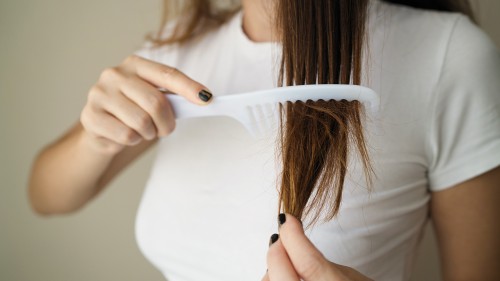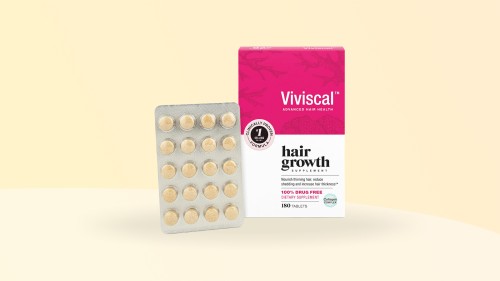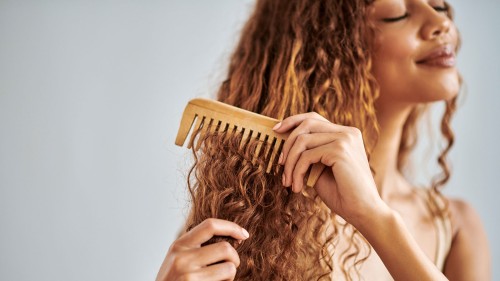10 Evidence-Based Tips for Faster Hair Growth
Published on May 18, 2022
Medically Reviewed by Natalie Olsen, MS, RDN
To grow your hair faster, you need to know how to care for it through each stage of growth. There’s a lot of misleading information about what actually helps hair grow faster. But certain medications, herbs, and hair care tips are proven to help.


There’s no shortage of products that claim to promote hair growth. Hair masks, vitamin supplements, and essential oils are often touted as the secret to longer and fuller hair.
But figuring out what actually works requires a deeper dive into the hair growth cycle and scalp health.
Fortunately, some hair growth methods have been around for decades with decent safety ratings. This article will summarize the best ways to grow longer hair in less time.
How Does Hair Grow?
Understanding the hair growth cycle is essential before taking the journey to grow longer hair. For most people, hair grows at an average rate of 1/2 inch per month.
However, smoking, environmental pollution, hormonal changes, diseases, stress levels, and hair texture all have the potential to impact hair growth. (1)
The shape of the hair follicle determines whether you have straight, wavy, curly, or frizzy hair.
Hair that comes in a curly or zig-zag pattern can seem like it grows more slowly because the overall length changes aren’t always as noticeable as with hair that grows straight.
Phases of Hair Growth
There are three phases of hair growth.
- Anagen Phase: The first is the growing or “anagen” phase. Hair usually spends between two to six years in the anagen phase. (2)
- Catagen Phase: The second phase of hair growth is the transitional or “catagen” phase. This phase is much shorter, just ten to 14 days. During catagen, the hair follicle stays put. It’s no longer growing, but instead, it starts preparing to fall out. (2)
- Telogen Phase: The third and final phase happens when the hair follicle sheds. This phase is called the telogen phase. Once a hair follicle falls out, it takes about three months before another strand of hair begins to sprout. (2)
The average human scalp has over 100,000 individual hairs. Since the anagen phase lasts the longest, about 90% of hair follicles are in the anagen phase at any given time. (2)
Summary
Everyone’s hair grows at different rates, but the average growth is a 1/2 inch per month. The anagen (growth) phase lasts longer for some people, making it easier for them to grow long hair.
Medicated Hair Products
Many shampoos, conditioners, and styling products say they’ll make your hair grow faster and stronger. But two active ingredients, minoxidil and caffeine, are most likely to deliver results.
Minoxidil
In the 1970s, a medication called minoxidil was introduced to help treat high blood pressure. Doctors noticed that previously balding patients experienced hair regrowth when taking minoxidil.
Manufacturers created a 2% and, eventually, 5% minoxidil solution during the 1980s and 90s, which are still used now. (3)
Today, scientists still aren’t quite sure how minoxidil increases hair growth.
One theory is that because minoxidil is a vasodilator, it improves circulation and the flow of nutrients to the hair cells.
In addition to increasing growth, minoxidil also reduces hair loss, prolonging the time until the hair falls. (3)
Minoxidil is currently approved by the FDA for the most common cause of hair loss, a condition called androgenetic alopecia.
However, it’s often used for other types of hair loss and is generally considered safe when applied to the scalp as a 5% maximum solution.
Some people notice itching or irritation from minoxidil, but switching to a less concentrated solution can help. (3)
Put It Into Action
- You can find minoxidil over the counter at your local pharmacy. Be sure to follow the instructions for the product you buy.
- You can choose a less concentrated solution if you notice irritation by opting for 2% instead of 5% minoxidil.
Caffeine
Caffeine isn’t just good for jumpstarting your day. It can also give your hair the boost it needs to grow faster. (4)
Studies suggest that caffeine can improve hair growth in the following ways:
- Blocking testosterone from causing hair loss.
- Increasing insulin-like growth factors.
- Prolonging the growth (anagen) phase.
- Promoting a longer hair shaft.
- Stimulating keratin production.
Research on caffeine-containing shampoos and lotions shows promising results for people with hair loss caused by alopecia (an autoimmune disorder).
After six months of daily use, shampoo with caffeine decreased hair shedding.
Caffeine lotions applied to the scalp had a similar effect. In just two months, 75% of participants were shedding less hair. After four months, this increased to 83% of participants. (4)
Put It Into Action
- Read the label on your hair products and search for a brand that contains caffeine.
- In the studies above, caffeine-containing shampoos were left on the hair for two minutes before rinsing out to give the product a chance to work.
Related: Understanding Caffeine: Is It Good or Bad for Your Health?
Natural Herbal Remedies
Essential oils and plant-based hair treatments have been around for centuries.
Ginseng, rosemary oil, and henna are three natural remedies supported by research for faster hair growth.
Ginseng
Ginseng is an ancient herbal remedy, with documented use going back 2000 years.
The active compounds in ginseng are sometimes referred to as ginsenosides. Growing evidence suggests that ginsenosides could play a role in hair growth. (1)
Certain ginsenosides act as antioxidants, meaning they help protect cells against damage from things like too much sun exposure.
Although sunlight offers some health benefits, ultraviolet radiation impairs the hair growth cycle and damages existing hair, so it’s more prone to breakage. (1)
Ginsenosides appear to block some of the adverse effects of sun radiation on hair cells.
Multiple pathways related to hair growth have been shown to respond positively to ginseng. And in a human clinical trial using oral Korean red ginseng, participants grew thicker and denser hair after taking the supplement. (1)
Put It Into Action
- In addition to basic sun protection measures, add ginseng drops to a hair serum to help boost your hair’s resilience.
- You could also try an over-the-counter ginseng supplement, but be sure to run it by your healthcare provider first.
Rosemary Oil
In another study, rosemary oil was tested against minoxidil for androgenic alopecia.
During the trial, 100 participants were divided into two groups. One group used 2% minoxidil on their scalp, and the other applied rosemary oil. (5)
After six months of treatment, both groups significantly increased the number of hairs on their head. The results suggest that rosemary oil may be just as effective as minoxidil for hair growth.
Furthermore, the most common complaint of an itchy scalp was less frequent in the rosemary oil group than in the minoxidil group. (5)
Put It Into Action
- Infuse your shampoo with rosemary oil. When it’s time to lather up, let the shampoo sit on your scalp for an extra minute or two to give the rosemary oil a chance to sink in.
- You can also rub a few drops of rosemary oil into your fingertips and massage your scalp when your hair is dry.
Henna
Lawsonia inermis powder is the technical term for henna.
When you think of henna, you may picture intricate skin tattoos that decorate a bride’s hands and feet during a traditional Indian wedding.
However, henna is also a natural, centuries-old hair dye and treatment loved by many cultures around the world. (6)
There’s a good reason why henna has withstood the test of time.
Studies show henna repairs damaged hair cuticles by binding to keratin proteins. The result is a stronger and more resilient hair fiber that appears thicker and doesn’t break as easily. (6)
Pure henna releases a reddish-orange dye that some people desire, but others want to avoid.
You can find henna hair dye mixed with other natural dyes, like indigo or cassia, which adjust the color.
It’s important to look for quality henna products free from harmful toxins.
With a bit of research and practice, henna hair treatments can significantly improve your ability to grow and maintain longer, healthier-looking hair. (6)
Put It Into Action
If you don’t mind a potential shift in hair color, try applying henna at home:
- First, mix henna powder with hot water until it’s a yogurt-like consistency.
- Then, apply the mixture to dry, clean hair, and let it sit for at least 30 minutes before washing it out.
- Henna hair masks can be messy, so make sure you wear dark clothing and keep rags nearby to clean up any drips.
Mindful Haircare
Hair Protection
Getting longer hair faster isn’t just about speeding up the growth rate. It’s also essential to consider ways to avoid breakage.
If your hair is fine or damaged, you may be losing length as it grows.
Keeping your hair nourished, strong, and protected will help encourage consistent growth and preserve the longer hairs you already have.
Minimizing harsh chemicals, heat styling, and rough handling of your hair can go a long way toward keeping it intact.
For instance, many people swear by the benefits of using a satin pillowcase to cut down on hair friction while sleeping.
You could also experiment with washing your hair less frequently to keep it from becoming dry and brittle.
Put It Into Action
- Don’t over-style or tug on your hair.
- Wearing your hair back in a loose braid and adding hydrating hair products can help protect it from everyday damage.
Scalp Massages
While focusing on your hair health, you could also consider taking some time out for a nightly scalp massage.
Regular 4-minute scalp massages given for 24 weeks were shown in a small study to stimulate hair growth and increase thickness. (7)
Even if the effects are minimal, you may stand to benefit from a few quiet moments of meditation during your massage.
Put It Into Action
- Set a reminder on your phone to do a nightly scalp massage when you’re relaxing at the end of the day.
- This is another opportunity to put rosemary oil or ginseng on your scalp for added hair growth benefits.
Weaves and Extensions
Increasing your hair length with a weave or extensions offers instant gratification. You can walk out of the salon with hair that’s several inches longer after just a few hours.
However, although these beauty treatments can give you the look you want right away, they can also stunt the growth of your natural hair. (8)
According to the American Academy of Dermatology Association, you can help prevent damage to your hair from extensions by:
- Giving your hair a break every two to three months.
- Going to a professional stylist, and letting them know if your hairstyle feels too tight.
- Keeping your scalp and natural hair clean by avoiding product buildup.
- Protecting your baby hairs or “edges” by using conditioners and avoiding heat styling.
Put It Into Action
- If you want longer hair without the wait, consider temporary clip-in extensions or a wig that doesn’t tug on your natural hair.
- If you opt for a more permanent weave, make sure you take good care of your scalp and underlying hair.
Address Why Your Hair Isn’t Growing
It’s exciting to hear about products that increase hair growth. But sometimes, growing hair faster can be achieved with healthier lifestyle habits.
If your hair growth has slowed down, there may be something else going on with your body that could use your attention.
Nutrient Deficiencies
A deficiency of iron, selenium, zinc, or protein may lead to suboptimal hair growth. (9)
Be sure to get enough protein and eat enough calories every day if you want to keep your hair growing at a normal rate.
It’s worth noting, however, that vitamin supplements aren’t always helpful. In fact, over-supplementing with selenium, vitamin A, or vitamin E can cause hair loss. (9)
That’s why asking your healthcare provider to assess your likelihood of a vitamin deficiency is essential before reaching for an over-the-counter supplement that may do more harm than good.
Put It Into Action
Find out how to improve your diet for faster hair growth by meeting with a dietitian. You can review your eating habits to spot potential deficiencies and learn how best to fix them.
Other Health Conditions
If you’re going through a stressful time, starting a new medication, or transitioning to a new phase of life (such as menopause or pregnancy), your hair growth can be affected.
Be mindful of any other symptoms you experience to help your healthcare provider identify a hormonal shift or more significant health concern.
Put It Into Action
Slow hair growth or hair loss can be a symptom of another health issue. Don’t be afraid to bring your concerns up with your medical provider, especially if the change happens all of a sudden.
The Bottom Line
For faster hair growth, it’s important to take good care of your body from the inside out. Good nutrition, stress management, and ruling out other health conditions are essential.
You can experiment with various over-the-counter hair products to improve the look and feel of your hair.
Look for the active ingredients minoxidil or caffeine for the best chance of a noticeable change in hair growth.
Remember to be wary of products that make lofty promises.
Maintaining the hair you have by avoiding damage and breakage is just as important as promoting hair growth from the root.
In addition, some people have naturally thin hair that doesn’t respond to treatments. If this is the case, you could look into a hair transplant, synthetic hair, or find a hairdresser who can help you work with what you’ve got.
At WellnessVerge, we only use reputable sources, including peer-reviewed medical journals and well-respected academic institutions.
- IJMS | Free Full-Text | Hair-Growth Potential of Ginseng and Its Major Metabolites: A Review on Its Molecular Mechanisms | HTML:
https://www.mdpi.com/1422-0067/19/9/2703/htm - Understanding hair growth cycle & hair growth phases - Cancer Hair Care:
https://www.cancerhaircare.co.uk/understanding-the-hair-growth-cycle/ - Minoxidil and its use in hair disorders: a review | DDDT:
https://www.dovepress.com/minoxidil-and-its-use-in-hair-disorders-a-review-peer-reviewed-fulltext-article-DDDT - Complementary and Alternative Treatments for Alopecia: A Comprehensive Review - PMC:
https://www.ncbi.nlm.nih.gov/pmc/articles/PMC6388561/ - Rosemary oil vs minoxidil 2% for the treatment of androgenetic alopecia: a randomized comparative trial - PubMed:
https://pubmed.ncbi.nlm.nih.gov/25842469/ - Scanning Electron Microscopy Approach for Evaluation of Hair Dyed with Lawsonia inermis Powder: in vitro Study:
https://scielo.conicyt.cl/pdf/ijmorphol/v38n1/0717-9502-ijmorphol-38-01-96.pdf - Standardized Scalp Massage Results in Increased Hair Thickness by Inducing Stretching Forces to Dermal Papilla Cells in the Subcutaneous Tissue - PMC:
https://www.ncbi.nlm.nih.gov/pmc/articles/PMC4740347/ - How to prevent hair damage from a weave or extensions:
https://www.aad.org/public/diseases/hair-loss/insider/stop-damage/prevent-hair-damage-weave-extensions - Diet and hair loss: effects of nutrient deficiency and supplement use - PMC:
https://www.ncbi.nlm.nih.gov/pmc/articles/PMC5315033/






